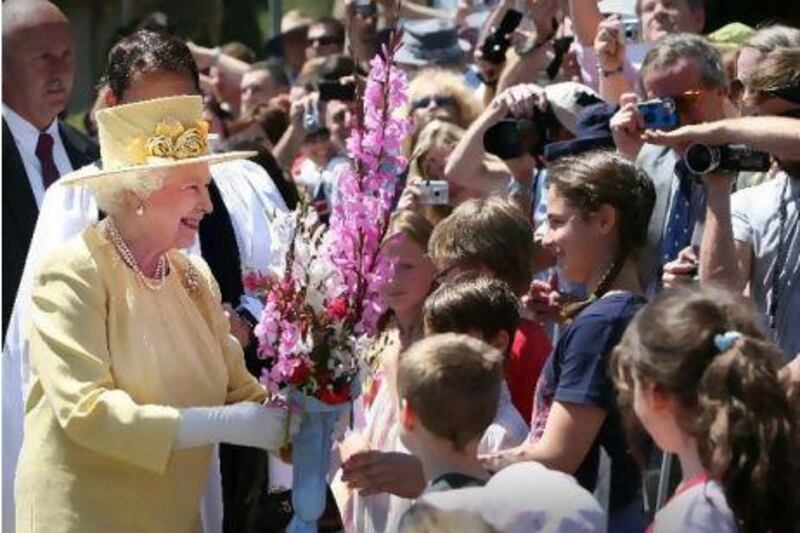SYDNEY // In 1999, Australia seemed set to cast off the last vestiges of British rule and enter the 21st century as a republic. But voters stepped back from the brink and a decade later, as the Queen Elizabeth pays possibly her last visit to the former colony, republican support is at a 20-year low.
Monarchists attribute that decline to a conservative younger generation, the popularity of the junior royals and the fading of the "Diana factor". Republicans blame lack of political leadership and the invisibility of the issue in public debate. It's expected nothing will change until the queen's reign ends, such is the affection for the 85-year-old monarch.
Founded as a British penal colony, Australia became an independent nation in 1901. Until the 1950s and a wave of post-war immigration from Europe, followed by an influx of migrants from Asia, many Australians continued to regard Britain as the mother country. Nowadays, one in four Australians were born overseas and the queen's role is largely ceremonial, although she theoretically retains the power - through her representative, the governor-general - to hire and fire governments.
The Commonwealth replaced the British Empire and on Friday the monarch - who arrived last week for her 16th visit - will open the Commonwealth Heads of Government Meeting in Perth. It could be a lively event, with anti-Commonwealth activists planning to hold a protest march to demand "justice and climate action, not racism and war".
During the 1990s, Australia's transition to a republic seemed inevitable, with polls consistently showing majority support for change. But when a referendum was held in 1999, 54 per cent of people said no. The outcome was blamed on the fact that a president would have been elected by parliament, rather than by popular vote - and Australians are notoriously distrustful of their politicians.
Once the referendum failed, the issue fell off the agenda. A recent poll found only 34 per cent of people support constitutional change, the lowest figure since 1991, while 55 per cent favour the status quo.
Although a republic has long been the policy of the ruling Labor party, its rise to power in 2007 changed little. The prime minister, Julia Gillard, said last year the queen's death would be "an appropriate time for this nation to move to be a republic".
That comment offended monarchists, who anyway dispute that Australians have no appetite for Prince Charles as king.
"There will be a big push by republicans [after the queen's death], but it won't have much impact," predicts Philip Benwell, national chairman of the Australian Monarchists League. He believes Australians, who adored Diana, Princess of Wales, have forgiven Prince Charles for the failed marriage.
Mr Benwell also notes Australians' affection for Prince William, who has visited twice in the past two years, making a special trip in March to tour flood-devastated regions. That visit, Melbourne's The Age newspaper observed then, "may have done more to set back the republican cause than anything since the 1999 referendum". Then there was the excitement surrounding the Prince's wedding to Katherine Middleton in April.
But probably the biggest obstacle facing Australian republicans is the long and convoluted process of effecting change. Unlike New Zealand, for instance, which could cuts ties with the British monarchy through a simple vote in the one-chamber parliament, constitutional reform in Australia can only come about through a referendum requiring a majority not only overall but also in four of the six states.
Greg Barns, who was chairman of the Australian Republican Movement at the 1999 vote, is not surprised by the recent poll. He says that when the issue is at the forefront of debate, support for a republic rises markedly. He said he is confident that the queen's death will be a "natural stepping-off point".
"I don't think there's any stomach for Charlie as an Australian head of state," he says. "Once Liz has gone, the game is up. While there is great personal respect for the queen, the institution she represents has been moribund for many years, and she's the only thing holding it together.
"Visits by royal family members are just like showbiz now. They're the equivalent of a visit by an ageing, fading rock star; there's no substance to it. It's all just pizzazz. It's inevitable that Australia will become a republic, just as it's inevitable that New Zealand and Canada will become republics. It's only a question of when."
Mr Benwell, naturally, disagrees, and points to the conservatism of young Australians in contrast to their anti-establishment, baby-boomer parents. "They don't want change for the sake of change, and they can see that the system is working well, that it is a force for stability which protects our freedom and our democracy."





